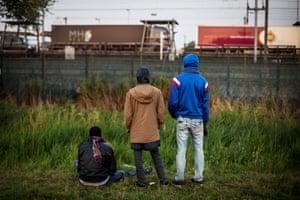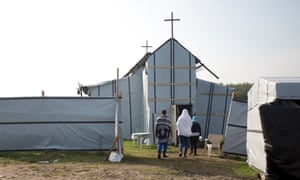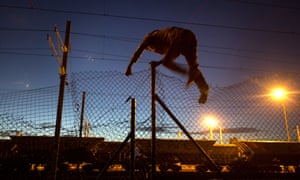On the dirt road, overlooked by the sparkling new silver fence and a knot of French police officers, some 30 men and boys are politely having their say. In four different languages, the point being made is much the same – “Why them, why not us?”
There is a new desperation palpable in the refugee camp at Calais, the Jungle. The refugee crisis is now fully on the political agenda, but even as donations of clothing and food are coming in, the news that the focus is on Syrians has deeply worried the people here who are fleeing other wars, other crises. Closely following political developments across Europe, they are angry at the distinctions they see being made.
“If you are Syrian you can get in, but David Cameron has forgotten that in Iraq we’re living with Islamic State, even if the British have gone,” said Jahid, from Mosul, close to angry tears. “You can’t know what’s happened to me or to him, yet you can say we are illegal,” he points at his friend before bowing his head and stomping off.
The feeling here, among refugees from older conflicts and their fallout – Iraq, Afghanistan, Sudan – is that their situation may have worsened. It is, said Azar Zhyan, 23, “bullshit humanity”. “Cameron spends £1m to build a fence when he could build a camp. The UN, Unicef, drive around in their giant Land Cruisers but don’t stop. French and British civilians are the only ones who help us. Afghans are refugees, Syrians are refugees. Let us in, and if we take your welfare throw us out. I want to live like a human being, pay taxes.”
As fences grow around the ports and security is ramped up, numbers congregating at other ports – Dunkirk and Ostend in Belgium – are rising as some try their luck elsewhere. At Dunkirk, several hundred people are in what is a growing sprawl of shelters. Franck Dhersin, mayor of nearby Téteghem, said the camp had doubled in size in a week. Téteghem has blamed a “British mafia” for running a smuggling operation between Dunkirk and the UK, pointing to the number of cars in the camp with GB number plates. Dunkirk has a reputation among the refugees as a dangerous place, where criminals make money from desperation. One Eritrean man there told the Observer: “Its not safe here, the smugglers will rob you or kill you.”

There have been refugees camped on this coast since before 1999, when the notorious Sangatte camp opened. In the Calais camps today there are up to 3,500 people, from Afghanistan, Sudan, Iraq, Eritrea, Ethiopia, and even a few now from the rapidly escalating war in Yemen. Some 130 women are in a separate camp. Each night hundreds of people walk to the port and tunnels to look for opportunities to smuggle themselves across the sea.
Abdul Rahman, 26, a mechanic from Afghanistan, has been deported already from Britain, where his father lives. “I try to go every night, but you get tired, you get hurt. It is three hours to walk there and back, you have little food. Three or four make it every night.
“Why do people reject us? Why Syrians? Why are we left where there is no food, no decency,” he said, pointing to a waterpipe leaking so profusely that the dirt pathways around are turning into spreading pools of mud. “I have been pepper-sprayed three times by police. There is a kind of game being played with people, but we are not stupid. They want to keep us ‘illegal’.”
Mixed feelings are reflected in slogans daubed on shelters: “We love France” and “France like dogs, in UK like humans”.
At St Michaels, a sheet-plastic church built by Ethiopians, men wearing prominent crucifixes around their necks prepare for Saturday’s Eastern Orthodox church new year celebrations, sawing wood for seating. Solomon has heard from home that the police have been round hassling his mother, looking for him. His brother, a journalist, is already imprisoned. “We all have stories. Not always war, not always from Syria, but bad.”

The authorities have stopped 39,000 attempts to cross the Channel illegally since this time last year. Eurotunnel says it has prevented 37,000 since January. People are taking more risks – there are lots of refugees with ankle and other leg injuries, gained falling from trains, off fences and in the dark of lay-bys.
British and French volunteers are helping, too. People like Lucy and Harry, 19-year-old students who have driven over from Newbury, Berkshire, with a bootful of sleeping bags. Acting coach Tom Radcliffe and potter Shizuka Maruta are here from Kent. “Everyone wants to help, there’s just masses of people volunteering,” said Radcliffe. “We crowdfunded for £1,000 and got £60,000 plus a warehouse. People are incredibly disillusioned with the charity sector, when you’ve got the big charities all off investing in their corporate sponsorships or whatever, it’s just insane. This is a search for sanity, a straightforward search for humanity amid an inherently crap political response.”
Alpha, an artist from Mauritania, has been in the camp a year now, building himself a traditional African hut and creating artworks out of bits of wood and plastic. He is waiting for France to process his asylum application. “I speak English, I love England,” he said. “But five months ago I gave up trying to get there. I can speak French, but most people find this language very hard, they know some English, they have a link, maybe friend or cousin or, for the Sudanese people, they had the English in their country. Now you hear England only wants Syrians, not people from other countries, people are angry. Why is one war more than another war?
“Here is not life, but we make it life. Now another winter is coming. If anybody had told me how it would be here, I would have cried.”
